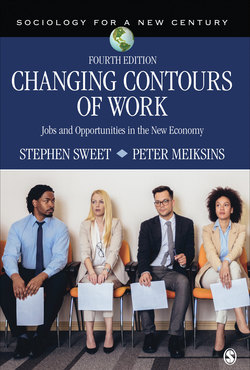Читать книгу Changing Contours of Work - Stephen Sweet - Страница 12
На сайте Литреса книга снята с продажи.
Exhibit 1.2Tammy: A Midcareer Manufacturing Worker Attempts to Salvage a Career and a Community
ОглавлениеTammy was born into a disadvantaged family in 1966 in Youngstown, Ohio. Early on, she was raised by her grandmother, who worked as a maid and companion to an elderly widow, but, at least for part of her childhood, she also lived with her mother, who was trying to recover from drug abuse. The city she grew up in entered a steep decline when she was a child; the steel mills began to close and the neighborhoods deteriorated as the people who lost their jobs left to find work elsewhere.
When she was fifteen, Tammy got pregnant; she broke up with the father and raised the baby on her own. She was determined not to drop out of school or be like many of the other girls around her, so she finished high school on time and later earned an associate’s degree. She worked for a while in a supermarket and hoped for a manager’s job, but nothing materialized. After a stint on welfare, she was able to find a job working in one of the region’s few remaining industrial establishments, the Packard Electric Plant in nearby Warren, Ohio, making electrical components for GM cars. She worked there for two decades (earning as much as $25 an hour), as the plant slowly shrank around her and the union that represented workers grew steadily weaker.
In the early 2000s, a series of corporate and legal maneuvers resulted in the plant becoming part of GM’s Delphi Automotive Systems, which was then spun off as a separate company. Delphi eventually filed for bankruptcy in 2005 in an attempt to get out of its union contract and wind the company down. Like many workers who had lived through the company’s gradual shrinkage, Tammy did not fully foresee Delphi’s decision to close or sell most of its units and eliminate two-thirds of its workforce. Some workers at Tammy’s plant would be kept on—but with dramatic cuts to their wages and benefits and likely eventual job loss. The alternative was to accept a lump-sum buyout but also lose most of their pensions. Tammy accepted the buyout, determined to do something else with her life.
Tammy invested some of the money she received from the buyout with a relative who was speculating in real estate. At first, she received good returns on her investment but later lost most of her money when the real estate bubble of the late 2000s collapsed. She had to beg her relative to return a small portion of her investment so that she could keep her small house. She went back to school to earn a bachelor’s degree and was approached by a professional organizer who was looking to hire community organizers to help combat the effects of Youngstown’s decline. Tammy was passionate about her city and determined to do something, so she got the job. Since then, she has worked on several surveys of her city, which made her even more aware of the decline brought about by deindustrialization. Even as the fracking boom began to create jobs in the region, Tammy could see that most of the people like her in Youngstown were not finding jobs and were being passed by. By comparison, she considered herself lucky.
Note: Based on The Unwinding: An Inner History of the New America by George Packer, 2013, New York: Farrar, Straus and Giroux.
